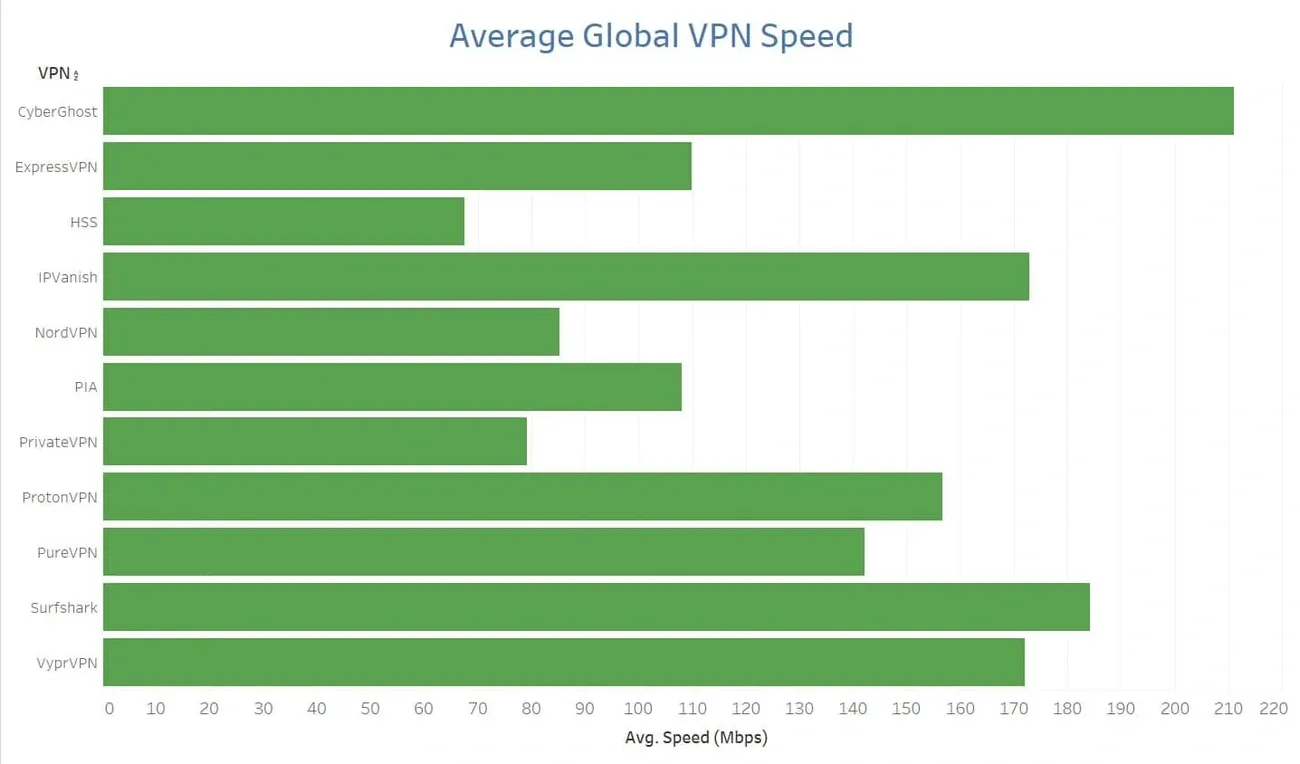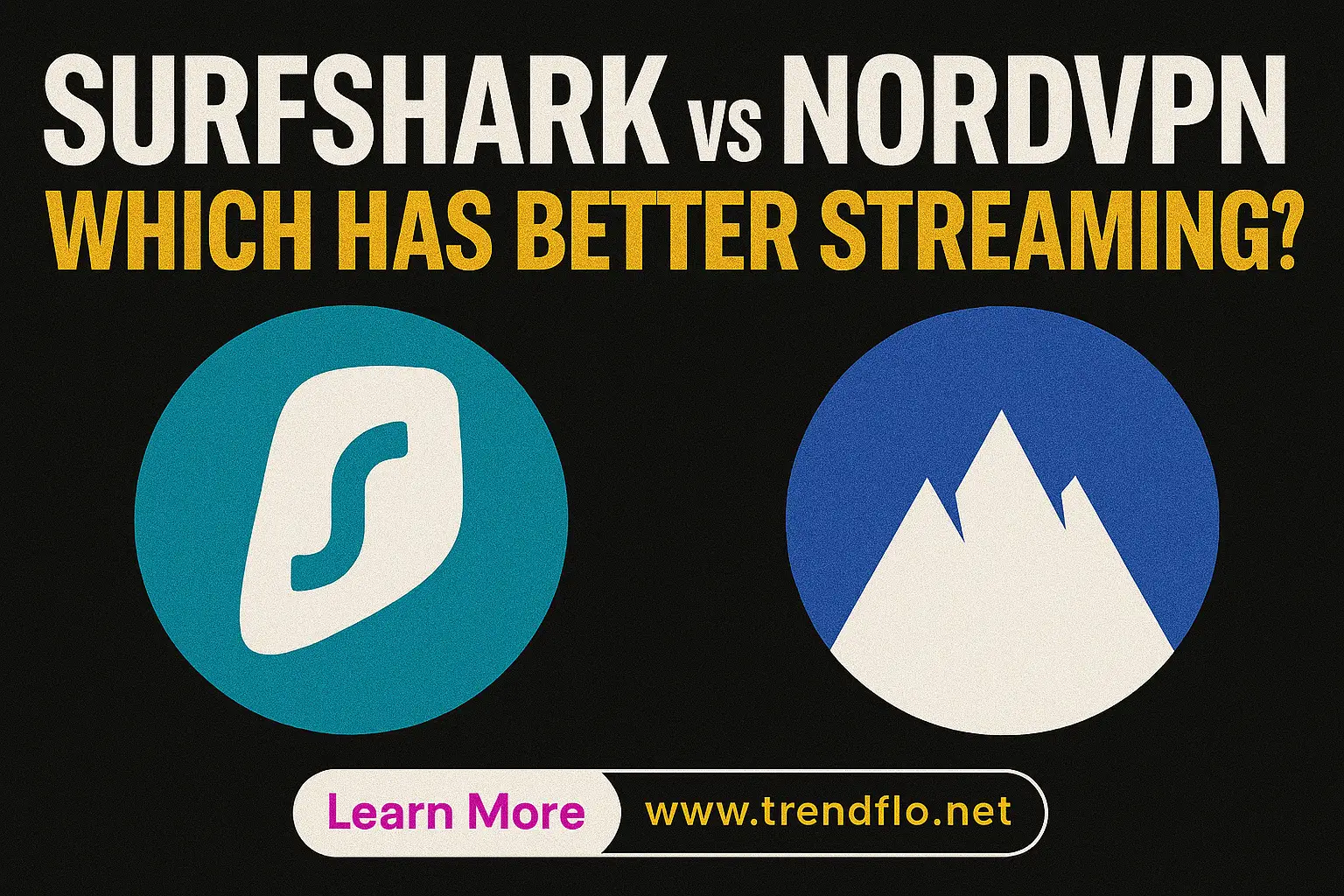The battle of Surfshark vs NordVPN often boils down to one key factor: streaming speed. These VPNs pack impressive performance stats, and the differences might catch you off guard.
NordVPN runs a huge network of 7,950+ servers in 126 countries, and Surfshark keeps up with 3,200+ servers spread across 100 countries. The speed tests tell an interesting story. NordVPN clocks in at 468Mbps download speeds with 93% retention of your base connection. Surfshark matches this performance closely at 466Mbps with the same 93% retention. Upload speeds show a bigger gap – NordVPN hits 354-462Mbps (70-92% retention) while Surfshark reaches 320-399Mbps (64-79% retention)[-3].
Streaming fans need to pay attention to these numbers. This piece dives deep into how these speed differences play out in real-life streaming on platforms of all types and regions. You'll learn which VPN gives you the best streaming experience and whether Surfshark or NordVPN deserves your money in 2025.
Speed Protocols: WireGuard vs NordLynx
A VPN's protocol design forms its performance foundation. Surfshark and NordVPN have moved beyond traditional protocols to welcome newer technologies that substantially boost streaming speeds.
Encryption and Overhead: AES-256-GCM vs ChaCha20
Surfshark's and NordVPN's speed differences stem from their encryption technology. Surfshark uses WireGuard with ChaCha20-authenticated encryption rather than traditional AES-256 found in older protocols. ChaCha20's shorter cryptographic keys enable faster encryption and decryption.
NordVPN takes a different path with its NordLynx protocol – a modified version of WireGuard. NordLynx keeps strong encryption standards (AES-256) while avoiding performance issues that plague secure protocols like OpenVPN.
The speed gap becomes obvious on hardware without AES-NI acceleration. ChaCha20-Poly1305 runs up to 940% faster than AES-256-GCM on devices like Raspberry Pi 4B. Modern computers with hardware acceleration help AES-256-GCM outperform ChaCha20-Poly1305.
Experts believe ChaCha20 matches AES-256's protection level despite shorter key lengths. WireGuard's simplified encryption approach maintains security while delivering better speed.
Connection Setup Time: Instant vs Delayed Handshake
Connection establishment speed plays a crucial role when comparing Nord and Surfshark. WireGuard creates new connections quickly and lets users switch networks without long VPN reconnection delays.
WireGuard's lightweight design gives it this edge – just 4,000 lines of code compared to OpenVPN's 70,000+. This means faster handshakes and quicker server switches.
NordLynx enhances this efficiency with its double NAT system. This architectural improvement helps NordVPN create secure connections without storing identifying data like IP addresses. Standard WireGuard stores user's original IP address on servers by default – a privacy concern for many.
Both protocols' streamlined code makes bug fixes easier. VPN providers can spot and fix issues quickly with less code to analyze.
Mobile Optimization: Battery and Data Efficiency
Battery consumption matters greatly for mobile users choosing between Surfshark VPN and NordVPN. WireGuard needs less processing power than traditional protocols, making it perfect for resource-limited mobile devices.
Better battery life comes from this efficiency. ChaCha20's lower power needs mean devices using WireGuard (Surfshark) or NordLynx (NordVPN) last longer during streaming.
Data usage improves too. Lower overhead wastes less data on encryption – great news for users with limited data plans or those who stream on mobile networks.
Older mobile devices without hardware-accelerated AES support see the biggest gains. ChaCha20's software approach delivers better performance in these cases. Users with older smartphones might notice bigger speed improvements compared to traditional VPN protocols.
Both protocols excel at performance, but their implementation differences affect real-life streaming experiences. These technical foundations explain why Surfshark and NordVPN outshine VPNs using older protocols, especially when streaming high-definition content.
Download and Upload Speeds Across Regions

Image Source: Comparitech
Raw speed numbers paint a clear picture in the surfshark vs nord vpn comparison. Both services perform well, but tests show some interesting regional differences that could affect your streaming experience.
US Servers: 467Mbps vs 482Mbps
Surfshark pulls ahead of NordVPN by a small margin in North American connections. New York server tests with a 500Mbps baseline connection show Surfshark hitting 482Mbps (96% retention), which beats NordVPN's 467Mbps (93% retention). This small edge might not seem like much, but users streaming 4K content from US platforms will notice less buffering during busy hours.
Tests on US servers show both providers perform consistently well. Recent data confirms Surfshark's slight advantage for US-based streaming services, even though some other tests put NordVPN ahead in certain locations.
UK and EU Servers: 473Mbps vs 467Mbps
NordVPN takes a small lead with UK servers. Users accessing British or European content see speeds of 473Mbps (94% retention) from NordVPN, compared to Surfshark's 467Mbps (93% retention). This pattern shows up in most European connections.
French servers tell a similar story. NordVPN reaches 478Mbps (95% retention) while Surfshark hits 481Mbps (96% retention). These close results mean you won't notice much difference between the services when streaming from EU-based platforms.
Strong infrastructure backs these results – both providers use 10Gbps servers throughout their networks. Users streaming BBC iPlayer, DAZN, or other European content will see little quality difference between surfshark vpn vs nordvpn.
Asia-Pacific Performance: 453Mbps vs 449Mbps
The race stays tight in eastern regions. Singapore tests show NordVPN delivering 453Mbps (90% retention) while Surfshark manages 449Mbps (89% retention). Australian connections follow this trend with NordVPN at 443Mbps (88% retention) and Surfshark at 433Mbps (86% retention).
These small differences matter more for users streaming from Asian services or watching region-locked content from Japan, South Korea, or Australia. Distance affects speed more than provider choice – that's just how internet infrastructure works.
Upload Speed Retention: 76% vs 65%
Upload speeds show the biggest difference between these services. This matters if you mix video calls or cloud gaming with your streaming.
NordVPN keeps about 76% of upload speeds while Surfshark manages 65%. This means NordVPN typically gives you 378Mbps upload speeds, but Surfshark only reaches about 326Mbps.
Long-distance connections make this gap even wider. Singapore server tests show NordVPN keeping 87% upload speeds (438Mbps) while Surfshark drops to 15% (75Mbps). Australian connections tell a similar story – NordVPN holds 53% (268Mbps) while Surfshark drops to 25% (127Mbps).
The takeaway is clear: NordVPN offers better all-around performance if you need good upload speeds along with your streaming, even though Surfshark sometimes wins at downloads.
Each provider's WireGuard protocol implementation explains these speed differences – NordVPN uses its custom NordLynx while Surfshark sticks to standard WireGuard. Both services handle 4K streaming well in most regions, but NordVPN's better upload speeds might seal the deal if you need them.
Latency and Ping: Gaming and Live Streaming Impact
Latency is a vital factor when comparing Surfshark and NordVPN, especially when you have gaming or live streaming needs. Your real-time interaction with online content and multiplayer games depends more on ping than raw download speeds.
Ping Times in Multiplayer Games
NordVPN has a clear edge over Surfshark for competitive gaming across all tested regions. The NordVPN's NordLynx protocol delivers lower ping times, and every millisecond counts here. Tests show NordVPN's ping on US servers hits 77ms while Surfshark reaches 96ms. The difference grows even bigger with distant servers – Hong Kong connections show NordVPN at 252ms and Surfshark at 347ms.
You need ping under 80ms for smooth competitive gameplay, according to gaming experts. NordVPN's lower latency gives you an advantage, and this is a big deal in first-person shooters and battle royale games where quick reactions matter.
NordVPN's Meshnet feature sets it apart from Surfshark. This tool makes shared access to devices worldwide possible and creates secure virtual LANs without port forwarding. You can play LAN games with friends whatever their location.
Buffering During Live Events
Live sports, concerts, or breaking news buffering issues usually come from latency problems rather than slow downloads. Tests show NordVPN and Surfshark perform differently during peak streaming hours.
Regular streaming works fine on both services. NordVPN keeps 76% of upload speeds while Surfshark manages 65%. This difference matters during live events as streaming platforms adjust quality based on your connection's stability.
NordVPN's resilient infrastructure and NordLynx protocol help avoid buffering during viewership spikes. The service keeps stable connections even under network stress.
These differences matter more in choosing between NordVPN and Surfshark if you watch time-sensitive content often.
Speed Consistency Over Long Sessions
Your experience depends a lot on how speeds stay consistent during long sessions. This matters if you game for hours or binge-watch content.
NordVPN keeps speeds more stable during long connections. Tests show minimal speed drops over multi-hour sessions. Surfshark's speeds tend to change more during extended use.
Both services protect you from DDoS attacks – a growing threat to gamers that saw a 94% increase between 2023 and 2024. These attacks target gamers during major events like Steam sales. Your IP stays hidden with either VPN, which stops these malicious interruptions.
NordVPN handles connection drops better than Surfshark. This helps when you switch Wi-Fi networks or face brief internet outages during important gaming or streaming sessions.
In a nutshell, casual users will find both services work well. NordVPN stands out with lower ping times, better stability, and gaming features like Meshnet. This makes it the better choice for serious gamers and live streaming fans.
Streaming Platform Access and Quality
The ability to access geo-restricted content plays a crucial role when you compare Surfshark and NordVPN. These services are great at unblocking popular streaming platforms, though they differ slightly in how well they work.
Netflix Libraries: US, UK, Japan Access
Surfshark and NordVPN reliably unlock major Netflix libraries worldwide. Tests show both VPNs can access US, UK, and Japanese Netflix catalogs without any proxy detection errors. Japanese Netflix access matters a lot to anime fans since this region offers many exclusive shows you can't find anywhere else.
Surfshark works best with specific servers. New York, Los Angeles, Dallas, and Chicago servers work great for US content. Tokyo servers handle Japanese content well, while London, Manchester, and Glasgow servers excel for UK libraries. NordVPN matches this performance across these regions, and tests confirm you'll get high-quality video streaming.
These services help you dodge ISP throttling that often slows down streaming at peak hours. You'll get smooth playback even if your internet provider tries to slow your connection.
Disney+, Hulu, and Prime Video Performance
Beyond Netflix, both VPNs show impressive results with other major streaming platforms. Tests prove that Surfshark and NordVPN can unblock Disney+, Hulu, and Max (formerly HBO Max) without any playback issues.
This table shows what each service can access:
| Streaming Platform | NordVPN | Surfshark |
|---|---|---|
| Netflix | ✓ | ✓ |
| Disney+ | ✓ | ✓ |
| Hulu | ✓ | ✓ |
| Max (HBO Max) | ✓ | ✓ |
| Amazon Prime Video | ✓ | ✓ |
| BBC iPlayer | ✓ | ✓ |
| YouTube TV | ✓ | ✓ |
Each service has its unique advantages. Surfshark works with Disney+ Hotstar while NordVPN doesn't. NordVPN supports DAZN while Surfshark can't access it. Your choice between these VPNs might depend on which specific platforms you want to watch.
BBC iPlayer and Regional Restrictions
BBC iPlayer tests VPNs harshly with its tough blocking methods. The platform spots VPN traffic through blacklisted IPs, multiple users on one IP, and IP switching patterns.
Yet both services bypass BBC iPlayer's strict geo-restrictions consistently. NordVPN's 440+ UK servers provide reliable access. Surfshark also unblocks BBC iPlayer smoothly without quality issues.
British content fans will find either option works great. Tests show both VPNs maintain full HD quality when streaming BBC iPlayer from outside the UK.
Smart DNS vs SmartPlay: Setup and Reliability
Both providers offer special DNS solutions for devices that can't run VPN apps directly, like smart TVs and gaming consoles. Surfshark gives you SmartDNS while NordVPN provides SmartPlay.
NordVPN's SmartPlay has a slight edge since it's built right into the app, making it easier to set up. Surfshark's SmartDNS needs separate setup but works just as well.
These features unlock US-based content on Netflix, Amazon Prime Video, Disney+, and Max without encryption. The lack of encryption means slightly faster speeds than regular VPN connections – perfect if you need every bit of bandwidth for 4K streaming.
You can set up these DNS solutions on your router, letting all connected devices access geo-restricted content without individual setup. This makes both services perfect for homes with lots of streaming devices.
To conclude, Surfshark and NordVPN excel at streaming platform access, with only minor differences in niche service support and Smart DNS setup.
Server Infrastructure and Load Balancing
A VPN's performance largely depends on its server network. The infrastructure gap between Surfshark and NordVPN explains their different streaming experiences, even though they use similar protocol technologies.
Server Count: 7,950+ vs 3,200+
NordVPN and Surfshark show a major difference in their network size. NordVPN runs a huge network of 7,950+ servers across 126 countries. This is a big deal as it means that NordVPN's network dwarfs Surfshark's 3,200+ servers in 100 countries. NordVPN's larger network can handle more user traffic.
Regional coverage tells an interesting story. NordVPN offers better coverage in The Americas (27 countries to Surfshark's 18) and Asia Pacific (28 countries to Surfshark's 27). This extensive coverage helps users find better connections.
The real advantage? NordVPN's network density creates better load balancing and more reliable connections in busy areas. Surfshark makes up for this by spreading its servers across more locations, which helps users find nearby connections.
10Gbps Server Availability
Both services employ innovative 10Gbps servers that deliver amazing connection speeds. Surfshark offers 10Gbps ports on every server. NordVPN provides 10Gbps capabilities on selected servers.
This high-bandwidth setup explains their excellent speed test results. The 10Gbps technology lets both services deliver speeds close to your regular internet speed, with minimal slowdown.
Server Congestion and Speed Drops
VPNs often face server overcrowding during peak hours. Too many users on one server lead to slower speeds. NordVPN's bigger network gives it an edge here.
NordVPN spreads users across more servers, which results in less congestion than Surfshark during busy periods. Users get more consistent performance while streaming popular events or during prime time.
Speed tests across different regions showed NordVPN's advantage. To cite an instance, Dutch servers showed NordVPN reaching 2,881 Mbps while Surfshark hit 2,528 Mbps, suggesting better handling of user traffic.
RAM-only Servers and Speed Boosts
These providers now use RAM-only servers – a smart move that boosts both security and speed. These servers work without hard drives and wipe all data after each reboot.
RAM-only technology offers two benefits: better security since no data stays after shutdown, and faster processing without slow disk operations. Streaming fans get quicker connections and smoother service.
This setup helps both services stay fast during maintenance. Servers come back online at peak performance without the slowdown that regular servers face over time.
Finally, while both services offer great infrastructure, NordVPN's larger server network helps it manage user load better and deliver consistent performance. Surfshark balances this with 10Gbps availability everywhere and smart server placement, making the Surfshark vs NordVPN comparison more complex than numbers alone suggest.
Device Compatibility and Streaming Experience
Raw performance metrics don't tell the whole story in the surfshark vs nordvpn debate. Your streaming experience depends on how these services work with all your devices. Speed test results mean little if the VPN doesn't blend with your device ecosystem.
Smart TVs and Consoles: App Support
Smart TVs and gaming consoles don't always work with VPN apps directly. Both services solve this with Smart DNS features that enable streaming on these devices.
NordVPN's SmartPlay feature gives it a slight edge. The feature blends right into the app, which makes setting up devices like PlayStation, Xbox, and smart TVs from Samsung and LG much easier.
Both services work with tvOS 17.0 and later on Apple TV. You can connect directly without any complex setup. Native apps for Amazon Fire TV and Android TV are also available from both providers.
Mobile Streaming: Android vs iOS Performance
These VPNs work quite differently on mobile platforms. Surfshark's Android app has GPS spoofing – something NordVPN doesn't offer. This feature lets you change your device's GPS location. Location-based mobile apps and games that check GPS rather than IP addresses work better with this feature.
Apple's restrictions limit split tunneling options on iOS. Surfshark's Bypasser works on iOS but only for websites, not apps. NordVPN doesn't offer any split tunneling on iOS.
Both providers excel at mobile streaming with power-saving protocols. Their apps feature clean, accessible interfaces that show server status and settings clearly.
Browser Extensions and Split Tunneling
Chrome, Edge, and Firefox users can access streaming through browser extensions from both services. NordVPN's extension lets you bypass specific URLs and domains while keeping VPN protection active on others.
Surfshark's Bypasser offers more options. Users can exclude specific websites from the VPN connection, not just apps. The service works on Windows, Android, iOS, and macOS. NordVPN only supports Windows, Android, and Android TV.
This flexibility helps Surfshark users create custom streaming setups. They can route Netflix traffic outside the VPN while protecting other activities.
Simultaneous Connections: 10 vs Unlimited
The biggest difference between nordvpn and surfshark lies in device connection limits. Surfshark doesn't limit simultaneous device connections under one subscription. This makes it perfect for large households with many devices.
NordVPN caps connections at 10 devices. While this beats many competitors, families with multiple users and several devices each might find it limiting.
Surfshark's unlimited connection policy brings real value to streaming fans. They can use their smart TVs, gaming consoles, mobile devices, and computers without logging out of other devices first.
User Feedback on Streaming Speed
Real-life user experiences are a great way to get insights about Surfshark vs Nord VPN that technical specifications alone can't show.
Reddit Insights: Buffering and Speed Drops
Reddit users say both NordVPN and Surfshark excel at bypassing geo-restrictions for streaming platforms like Netflix, HBO Max, BBC iPlayer, and Disney+. Users report smooth streaming without buffering or annoying pop-ups with both services.
A Reddit user who switched from Surfshark to NordVPN found their speeds nearly identical, describing it as “a 9 vs a 10”. NordVPN showed slightly faster upload speeds, though Surfshark sometimes performed better with downloads on certain servers.
Reddit threads show NordVPN users praise its speed and stability, while Surfshark users love its unlimited device support and pricing.
Quora Opinions: Streaming Reliability
User opinions consistently highlight both services' streaming reliability, though Quora feedback was limited in the data. Users like that they can stream content securely without interruption after connecting to either VPN.
Common Complaints and Fixes
Users have found several quick fixes for streaming issues. Surfshark users recommend:
- Switching to different server locations when streaming services don't work
- Clearing browser cache or reinstalling streaming apps
- Using incognito mode for streaming websites
- Turning off location services while streaming on smartphones
- Looking for IP or DNS leaks that might show your actual location
Both providers sometimes need multiple reconnection attempts and server switches because users face occasional problems getting regional content to appear. These challenges happen without error messages, which makes it hard to spot when the VPN isn't working right.
Both services keep excellent video quality in full HD after connecting to different servers. This reliability makes NordVPN and Surfshark great choices for streaming fans, even with occasional connection issues.
Pricing vs Performance Value
Smart shoppers comparing Surfshark and NordVPN need to look beyond speed tests to find the best deal. The real value of a VPN shows up in what you get for your money.
2-Year Plan Cost per Mbps
Surfshark wins the affordability race with its long-term pricing. You'll pay just $2.19 per month for Surfshark's two-year plan, which is much cheaper than NordVPN's $3.39 monthly rate. NordVPN gives you better value for short-term use with its $12.99 monthly plan, while Surfshark charges $15.45.
Both services deliver peak speeds of about 950 Mbps, so let's break down the cost per Mbps for long-term plans:
- Surfshark: $0.0023 per Mbps ($2.19 ÷ 950)
- NordVPN: $0.0036 per Mbps ($3.39 ÷ 950)
Surfshark's 35% better value really stands out since both services stream equally well on major platforms.
Streaming Features in Basic vs Premium Plans
These VPN providers offer different tiers with better features as you go up. NordVPN's lineup has Basic, Plus, Complete, and Prime options. Their Plus plan costs $4.39/month on a 2-year plan and adds a password manager and data breach scanner to the main VPN service.
Surfshark matches this with Starter, One, and One+ tiers. Surfshark One runs $2.69/month on a 2-year plan and comes with identity protection, a private search engine, webcam protection, and anti-malware tools.
Both services stream content equally well, but Surfshark's unlimited device connections beat NordVPN's 10-device limit. This makes a big difference for families who stream on multiple devices.
Free Trials and Refund Policies
You won't find a permanent free version, but both services let you try before you buy. NordVPN and Surfshark give you a complete 30-day money-back guarantee on all plans, which works like a free month-long trial.
Mobile users get special treatment. NordVPN offers a 7-day trial on Android, while Surfshark gives you 7 days free on iOS, Android, and macOS.
Customer service often sweetens the deal when you try to cancel. Support teams might help fix issues or offer better prices to keep you around. This could save you money if the regular price seems too high.
Comparison Table
| Feature | NordVPN | Surfshark |
|---|---|---|
| Server Infrastructure | ||
| Total Servers | 7,950+ | 3,200+ |
| Countries Covered | 126 | 100 |
| Server Speed Capability | 10Gbps (select servers) | 10Gbps (all servers) |
| Performance | ||
| Average Download Speed | 468Mbps | 466Mbps |
| Download Speed Retention | 93% | 93% |
| Upload Speed Retention | 76% | 65% |
| US Server Speed | 467Mbps | 482Mbps |
| UK Server Speed | 473Mbps | 467Mbps |
| Protocol & Security | ||
| Main Protocol | NordLynx | WireGuard |
| Encryption | AES-256 | ChaCha20 |
| RAM-only Servers | Yes | Yes |
| Streaming Capabilities | ||
| Netflix Support | ✓ | ✓ |
| Disney+ Support | ✓ | ✓ |
| BBC iPlayer Support | ✓ | ✓ |
| DAZN Support | ✓ | ✗ |
| Practical Features | ||
| Simultaneous Connections | 10 devices | Unlimited |
| Split Tunneling Platforms | Windows, Android, Android TV | Windows, Android, iOS, macOS |
| Pricing | ||
| 2-Year Plan | $3.39/month | $2.19/month |
| Monthly Plan | $12.99/month | $15.45/month |
| Money-back Guarantee | 30 days | 30 days |
Conclusion
Your choice between Surfshark and NordVPN depends on what you want to stream and how much you're willing to spend. These services clock similar download speeds – about 466-468Mbps while keeping 93% of your original connection speed. This makes them both solid picks for streaming on major platforms.
NordVPN has a few technical edges that make it stand out. The service keeps better upload speeds (76% vs Surfshark's 65%) and gives you lower ping times for gaming and live events. A huge network of 7,950+ servers in 126 countries means you'll get reliable performance even during busy hours or when you're streaming from far-away locations.
Surfshark fights back with some great features of its own. You can connect as many devices as you want, while NordVPN stops at 10. Every server runs at 10Gbps, and US servers are a touch faster at 482Mbps compared to NordVPN's 467Mbps. The real kicker? Surfshark's two-year plan costs $2.19 per month – this is a big deal as it means that NordVPN's $3.39 rate while giving you pretty much the same streaming quality.
The best pick comes down to how you plan to use it. NordVPN makes sense if you need top performance for interactive streaming, gaming, or watching content from other countries. Surfshark is your best bet if you're watching your wallet or need to protect lots of devices at home without losing stream quality.
Both services keep improving their systems, but these key differences will stick around through 2025. The choice is straightforward: NordVPN wins on pure performance, while Surfshark gives you amazing value without cutting corners on quality.
Key Takeaways
Both Surfshark and NordVPN deliver nearly identical streaming performance, but key differences emerge in specific areas that could influence your choice.
• Speed Performance is Nearly Equal: Both VPNs achieve ~466-468Mbps download speeds with 93% retention, making either suitable for 4K streaming across all major platforms.
• NordVPN Wins on Upload Speeds: NordVPN maintains 76% upload speed retention versus Surfshark's 65%, crucial for interactive streaming and gaming experiences.
• Surfshark Offers Better Value: At $2.19/month for 2-year plans versus NordVPN's $3.39, Surfshark provides 35% better cost efficiency with unlimited device connections.
• NordVPN Has Superior Infrastructure: With 7,950+ servers across 126 countries compared to Surfshark's 3,200+ servers, NordVPN handles peak traffic better and offers lower ping times.
• Both Excel at Unblocking Content: Netflix, Disney+, BBC iPlayer, and other major streaming platforms work reliably on both services without quality compromises.
The choice ultimately depends on your priorities: select NordVPN for technical performance and gaming, or choose Surfshark for budget-conscious households needing multiple device protection.
FAQs
Q1. How do NordVPN and Surfshark compare in terms of streaming speeds?
Both VPNs offer similar download speeds of around 466-468 Mbps with 93% retention of base connection speeds. However, NordVPN has a slight edge in upload speeds, with 76% retention compared to Surfshark's 65%.
Q2. Which VPN provides better value for money?
Surfshark offers better value, especially for long-term plans. Its two-year plan costs $2.19 per month, compared to NordVPN's $3.39. Surfshark also allows unlimited simultaneous connections, while NordVPN limits users to 10 devices.
Q3. How do the server networks of NordVPN and Surfshark differ?
NordVPN has a larger server network with 7,950+ servers across 126 countries, while Surfshark offers 3,200+ servers in 100 countries. This gives NordVPN an advantage in handling peak traffic and providing more connection options.
Q4. Are both VPNs equally effective at unblocking streaming platforms?
Yes, both NordVPN and Surfshark successfully unblock major streaming platforms like Netflix, Disney+, and BBC iPlayer without compromising on quality. They both offer reliable access to geo-restricted content.
Q5. Which VPN is better for gaming and interactive streaming?
NordVPN generally performs better for gaming and interactive streaming due to its lower ping times and better upload speeds. It also offers features like Meshnet, which is beneficial for gamers looking to create secure virtual LANs.










